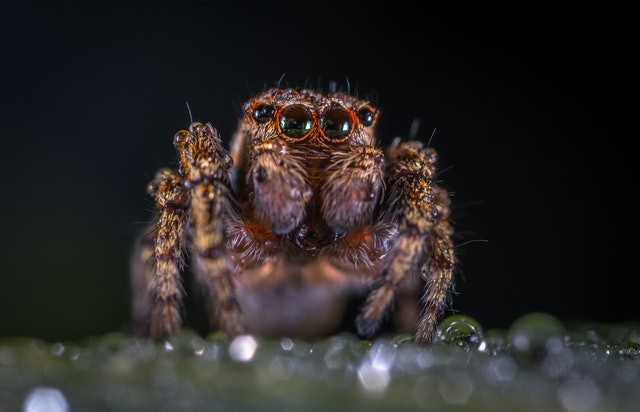Some female spiders tend to consume their partners after copulation, which has led to a widow-making reputation. However, some male orb weaver spiders have devised a spectacular survival strategy: they launch themselves to safety at incredible speeds.

Studying Spiders
Male orb-weaving Philoponella prominens spiders avoid being eaten by mates by catapulting away
— Cell Press (@CellPressNews) April 25, 2022
Read more in @CurrentBiology: https://t.co/cjTP9qkeDN#HubeiUniversity Shichang Zhang, @NUSingapore Daiqin Li pic.twitter.com/ovGfBh7jh7
On Monday, a group of researchers led by ecologist Shichang Zhang of Hubei University in China released a paper in the journal Current Biology on the spiders' energetic escapes.
Male Philoponella prominens orb weaver spiders are the arachnid equivalent of kangaroos.
The male spiders use a joint in their first pair of legs to immediately engage in a split-second catapult action, flinging themselves away from their partners at impressive speeds of up to 88 centimeters per second (cm/s), according to Cell Press, the publisher of Current Biology, in a news release Monday.
Recording the Process
The researchers recorded footage of the catapulting process, demonstrating the males' fast escape strategy.
Males that didn't launch away after sex was captured and consumed "in the act of sexual cannibalism," the researchers discovered when studying sexual selection in orb weavers who live in vast colonies. They saw 155 successful matings, with 152 of them leading to freedom. The three who didn't catapult were destined to be dinner.
The researchers tested their theories by preventing 30 guys from catapulting away. Those men were also served as supper.
"Females may utilize this behavior to assess a male's quality during mating," Zhang speculated. "If a male is incapable of catapulting, kill it; if a male is capable of doing it several times, take his sperm."
Arachnid Sex Rituals
It may be a world where spiders devour spiders, but at least some arachnids have worked out how to survive. It takes strong legs and good timing, which is life counsel that many might benefit from.
Spiders have strange sexual preferences. But it's all in good humor... No, wait, it's rather dangerous. There's screaming wailing, blocked orifices, torn-off genitals, devoured body parts, and hallucinogenic ceremonies whether a female or a guy murders the other.
Bizarre
And you thought humans had bizarre sexual preferences? There has been a growing body of information demonstrating how bizarre spider sex is in recent years.
For example, courting lasts 50 minutes for males contending head-to-head for mating rights and 4.5 hours for solitary, non-competing males in the case of redback spiders (Latrodectus hasselti). Although the larger male redbacks are usually preferred, scientists have discovered that the smaller ones are superior to their larger counterparts because they develop faster and are more agile.
Meanwhile, adult jumping spiders wear a racy outfits on their bodies to attract mates, as though they were going to a rave. Males have UV-reflecting scales that shine brilliant white and green, and females have UV-reflecting front appendages that light bright green.
Females and males, it turns out, will ignore each other if they are not viewed under full-spectrum light, implying that both partners must demonstrate their health by displaying their luminous bodies before courting can begin.
Spiders reproduce sexually; however, the male's sperm does not enter the female's body through the male's genitals. A stage in between is widespread. Males ejaculate onto little sperm webs that have already been prepared and then transport their sperm to palps, which are syringe-like structures on the ends of their front appendages. The male jumping spider will arch his body and slink on tiptoe toward the female as courting proceeds. If the wooing is successful, the male injects sperm from his palps into the female's genital hole on the bottom of her abdomen, known as the epigyne.
Related Article : Rapid Decline of Insect Population Causes Scientists to Worry About Earth's Future
For the most recent updates from the animal kingdom, don't forget to follow Nature World News!
© 2026 NatureWorldNews.com All rights reserved. Do not reproduce without permission.





